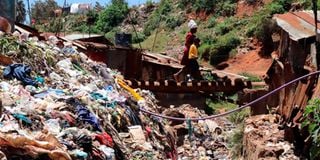Premium
Why the marginalised must now take their place in polls

Residents of Kibera slums walk on a makeshift footbridge built across a heap of uncollected garbage on February 27, 2022.
What you need to know:
- Marginalised communities have always been treated badly by the political class.
- Politicians should be accountable to the people who elect them.
I have been watching keenly over the years as the Mount Kenya Foundation asserts its authority in shaping and determining the political direction of our country. The elite club of billionaire businessmen does not sit and wait for Kenyans to elect its next leader: They interview presidential aspirants then settle on one, whom they give their moral and financial support during the election.
We have seen it in the past three elections, and again this year. Whether whoever they back wins or not, what is certain is, they protect their interests.
Which brings me to the question, why don’t we see underprivileged Kenyan communities doing the same? Why are people who live in villages, slums and peri-urban areas not on the negotiating table when the political future of the country is carved?
These communities might not be rich in the pocket but are more valuable to the politicians than those billionaires because they have what the political class values most: The numbers. They contribute close to 80 per cent of the voters. In Nairobi, over 60 per cent of the population live in slums. That translates to 2.5 million people with Kibera, Mathare, Mukuru and Kawangware the most populous.
The world over, we see at political debates in the lead up to an election communities put politicians to task, asking them the hard questions about what they would do should they win. We need to do the same here. These question-and-answer sessions cannot just be left to the wealthy few. Shofco organises communities to interview and debate with various aspirants, which should happen countrywide.
Manipulate the people
It is high time we started reminding our political leaders that we are their bosses and not the other way round. That if they do not respect and work for us, then they can forget our votes.
Marginalised communities have always been treated badly by the political class. You don’t see politicians campaigning in the ‘leafy suburbs’ of Karen or Lavington but they will throng Kibera, Kawangware, Mathare, Mukuru and many other low-class areas. They lecture the residents about what they want to do but do not ask what need to be done.
The politicians will campaign on fancy cars where the poor live but negotiations are done behind the scenes in high-end hotels, top clubs and posh houses to discuss their personal and business interests. Who is fooling whom? We have to change that — by voting wisely and making our leaders accountable.
Politicians come to the slums once in five years to manipulate the people with a bag of rice, packet of sugar or Sh200. That is when they realise that slum dwellers are their true employer. They then disappear, not to be seen again until the next elections. That must end. Politicians should be accountable to the people who elect them. An election is not a one and done affair; it’s a question of service delivery.
The Constitution provides for recall of non-performing leaders. How I wish the masses knew that they have the ultimate power; that, without them, these politicians are nothing. Youth and women have suffered the most from this marginalisation. This is the time. Right the wrongs on August 9.
Mr Odede, founder and CEO of Shining Hope For Communities (Shofco), is co-author of the ‘New York Times’ bestselling book ‘Find Me Unafraid: Love, Loss, and Hope in African Slum’ and winner of several humanitarian awards. [email protected]





